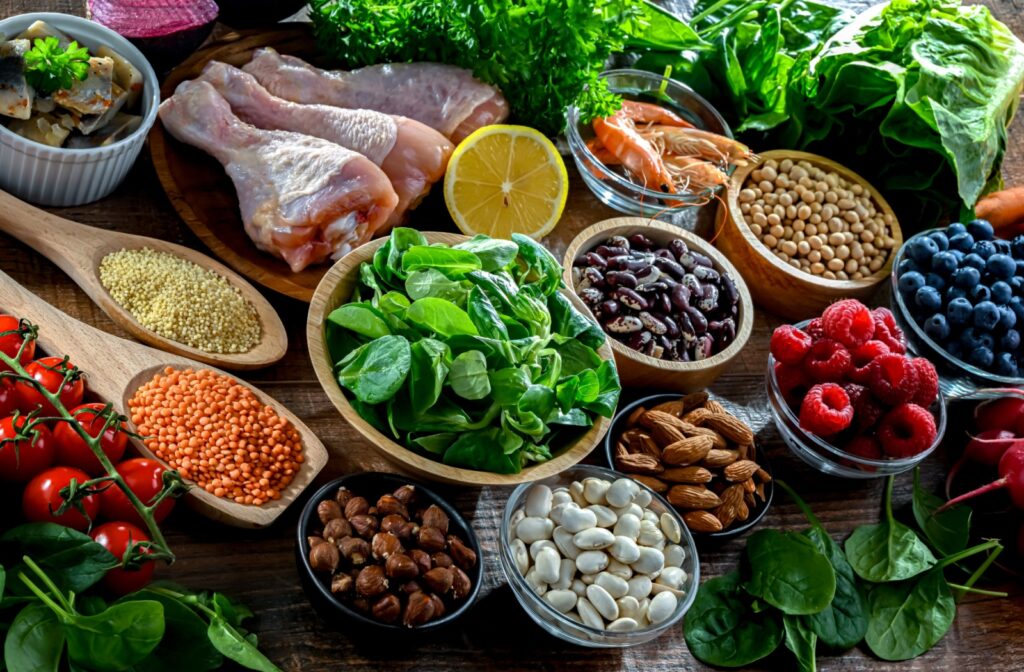When it comes to caring for loved ones with dementia, one key aspect often overlooked is nutrition. We’ve all heard the saying “You are what you eat,” but can what’s on your plate really affect dementia progression?
Research suggests that diet can impact dementia progression. A nutrient-rich diet helps support cognitive function, reduce inflammation, and protect brain cells. While diet alone can’t stop dementia, it has potential to slow its progression and improve quality of life for those living with the condition.
Key Nutrients for Supporting Brain Health
Certain nutrients have been linked to supporting brain health and may even help protect against cognitive decline:
Omega-3 Fatty Acids
Found in fatty fish like salmon and sardines, omega-3s are vital for brain function. They help reduce inflammation and improve communication between brain cells, supporting memory and cognitive health.
Antioxidants
Foods like berries, spinach, and kale are rich in antioxidants, which protect brain cells from damage. These nutrients can help slow age-related cognitive decline.
B Vitamins (B6, B12, Folate)
These vitamins are crucial for nerve function and neurotransmitter production. A lack of B vitamins may contribute to cognitive decline, so keeping up with these nutrients is important for brain health.
Vitamin D
Low levels of vitamin D are linked to cognitive decline. It may help maintain nerve cell health and regulates the brain’s immune system, which protects against neurodegeneration.
Polyphenols
Found in grapes, dark chocolate, and green tea, polyphenols may contribute to reduced inflammation and improved brain function, which helps protect against dementia.
Magnesium
Magnesium supports brain function by regulating neurotransmitters. Studies suggest that sufficient magnesium can help reduce the risk of cognitive decline.
Can a Particular Nutritional Diet Stop the Progression of Dementia?
While there’s no definitive cure for dementia yet, evidence suggests that certain dietary patterns may help slow its progression or even reduce the risk of developing the condition in the first place. A well-balanced diet rich in nutrients, combined with regular physical activity and mental stimulation, can be a powerful tool for preserving cognitive function. It’s also important to recognize that nutrition is just one piece of the puzzle; genetics, lifestyle choices, and overall health also play a significant role in dementia progression.
Diets That May Help Dementia Progression
Several specific diets have been researched for their potential to support brain health and slow dementia progression:
The Mediterranean Diet
This diet focuses on fruits, vegetables, whole grains, nuts, healthy fats (like olive oil), and moderate amounts of fish and poultry. It’s rich in antioxidants and omega-3s, which support brain health.
The DASH Diet
Designed to lower blood pressure, the DASH diet also benefits brain health. It emphasizes fruits, vegetables, lean protein, and low-fat dairy, while limiting unhealthy fats and sodium, improving blood flow to the brain.
The MIND Diet
A mix of the Mediterranean and DASH diets, the MIND diet is aimed at reducing Alzheimer’s risk. It encourages leafy greens, berries, nuts, whole grains, and fish, while limiting red meat, butter, and high-fat dairy.
The Ketogenic Diet
A high-fat, low-carb diet, the ketogenic diet may help improve brain function. It encourages the body to burn fat for energy, producing ketones that may have protective effects on the brain, especially in Alzheimer’s patients.

How Malnutrition Impacts Cognitive Decline
Malnutrition significantly impacts cognitive decline by depriving the brain of essential nutrients needed for proper function. Deficiencies in key nutrients like vitamin B12 can lead to memory problems, while a lack of omega-3 fatty acids can impair cognitive performance.
Malnutrition also weakens the brain’s ability to form new neural connections, accelerating the progression of diseases like Alzheimers. Beyond cognitive function, poor nutrition can affect mood and behavior, making it even more challenging for individuals with dementia to maintain their quality of life. Ensuring proper nutrition is therefore vital to slowing cognitive decline and supporting overall brain health.
What is the Number One Food Linked to Dementia?
While there isn’t one “magic food” that causes dementia, studies have shown that diets high in sugar and processed foods are linked to an increased risk of cognitive decline. Excess sugar, especially from sugary beverages and processed snacks, can lead to insulin resistance, which may contribute to Alzheimer’s disease. A high-sugar diet can also promote inflammation, damage blood vessels, and affect brain cells. For optimal brain health, it’s best to limit processed sugars and instead opt for whole, nutrient-rich foods.
The Role of Hydration in Dementia Prevention and Care
Hydration is another often-overlooked factor in memory care. Dehydration can lead to confusion, memory problems, and even physical decline, all of which can exacerbate dementia symptoms. It’s important to encourage seniors to drink enough water throughout the day, as dehydration can worsen cognitive symptoms and lead to further complications. In memory care, ensuring adequate hydration is just as critical as providing nutritious food.
Comprehensive Memory Care in Lewes, Delaware
Our memory care program offers personalized plans that address physical, emotional, and nutritional needs, including brain-boosting meals and hydration support. By focusing on nutrition and wellness, we help improve quality of life for those with dementia in Lewes, Delaware. Contact us today to learn more or schedule a visit to see how we can support your loved one’s care.




